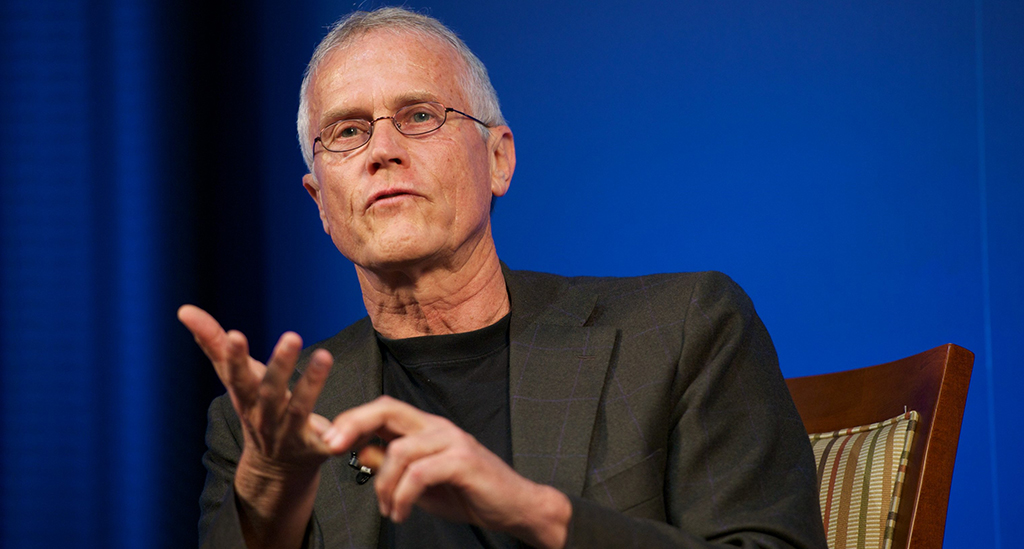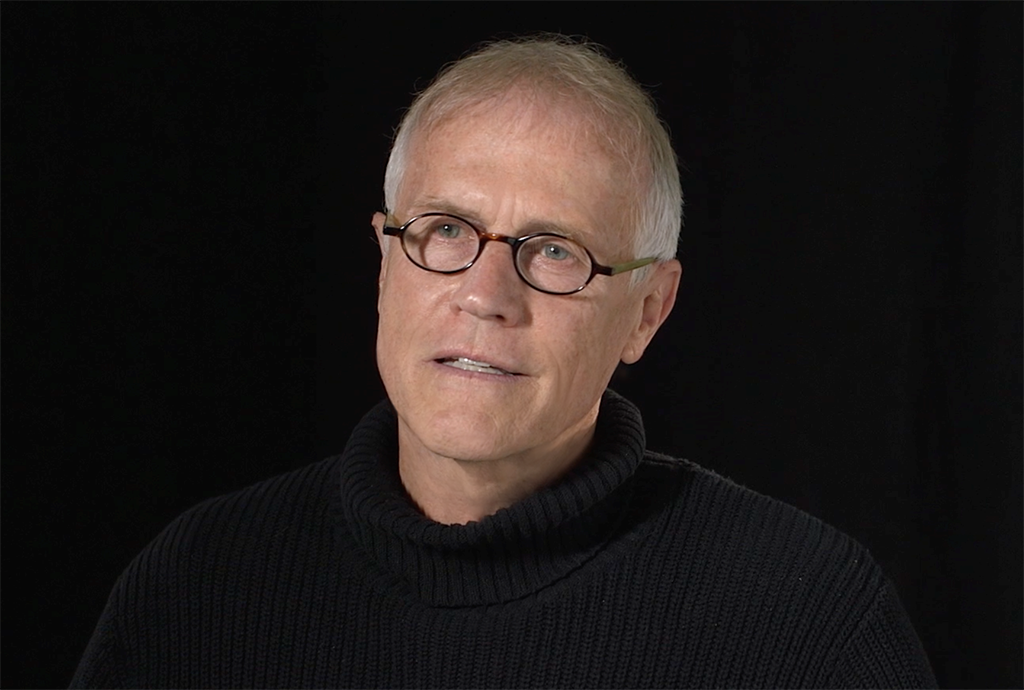A record-breaking heat wave, a town devastated by fire, sea animals cooked to death and far too many lives lost. And the summer isn’t even over yet in B.C.
Unprecedented wildfires and floods are now common across the world due to climate change, and our lives will be drastically transformed over the next decade and beyond. Expect a grim update when the latest report from the Intergovernmental Panel on Climate Change drops today.
But in the face of the planet’s most defining challenge and a fast-approaching deadline to address it, what can people like us reasonably do?
It’s a question noted environmentalist Paul Hawken sets out to answer in his new book Regeneration: Ending the Climate Crisis in One Generation, to be published in September.
Hawken had been thinking about Regeneration even before his last book about climate change, Drawdown — subtitled “the most comprehensive plan ever proposed to reverse global warming” — was released. “It was always my next book, the sequel,” he wrote in an email to The Tyee.
A lot has happened since 2017, the year Drawdown was released. The landmark Intergovernmental Panel on Climate Change report that warned of a 12-year-deadline to avoid climate catastrophe was released in 2018. The next year saw an explosion of youth-led movements across the world pushing for urgent climate action. More recently, the new U.S. administration seems to be more interested in addressing the issue and has rejoined the Paris Climate Agreement.
But a lot has stayed the same, too. Emissions continue to rise. Governments and institutions still drag their feet on climate action. Many of the main contributors to the crisis, particularly the fossil fuel industry that spent decades obscuring its responsibility, continue to obstruct progress.
The Tyee reached Hawken by email to talk about what individuals can do, how we got to this place in human history and what comes next. Our interview was edited and condensed for clarity and length.
The Tyee: How has your thinking on the climate crisis changed in the four years since your last book was released?
Paul Hawken: I always suspected that there would not be widespread action until global warming became experiential instead of conceptual. That is increasingly so and that has changed my thinking about how to communicate. Climate deniers are now completely irrelevant. Political corruption is the key obstacle, and it is a formidable challenge.
That being said, it is important that everyone take action in every way they can and not wait for political awareness or change. Part of taking action is voting, speaking truth to power, boycotts, influencing one’s peers. The greater part of action is making change on the ground, in our communities, across our regions, in our companies, within our schools, at our homes, closets and kitchens, etc.
While your 2017 book Drawdown tried to lay out a map for building a better future, it didn’t look then like we would actually ‘draw down’ our emissions to where they needed to be. Has that changed?
What has dramatically changed is the production, installation, innovation and cost reductions on renewables — solar and wind. They now outcompete fossil fuel-generated electricity on cost. It is no longer a race. Renewables won.
The main challenge there is the funding coming from U.S. and Canadian banks and China for coal- and gas-fired generation facilities in the developing world. If this continues, it will lock in non-renewable energy grids through 2050 and prevent what could a be a complete transition to renewable energy by some time in the 2040s.
JP Morgan, Bank of America, Wells Fargo, Royal Bank of Canada, TD Bank, Scotiabank and others have made $3.8 trillion in investments and loans to fossil fuel companies since the Paris Agreement. When you pull out a credit card from one of these banks, you are pulling out a card that is destroying our future.
What does ‘regeneration’ mean to you?
Regeneration means placing life at the centre of every action and decision. I was asked to come up with guidelines or principles by a friend, and in 15 minutes this is what I came up with. Others can make their own guidelines. These seem obvious to me, and I think they are common sense to anyone who wants to create a meaningful life on this planet.
- Does the action create more life or reduce it?
- Does it heal the future or steal the future?
- Does it enhance human well-being or diminish it?
- Does it prevent disease or profit from it?
- Does it create livelihoods or eliminate them?
- Does it restore land or degrade it?
- Does it increase global warming or decrease it?
- Does it serve human needs or manufacture human wants?
- Does it reduce poverty or expand it?
- Does it promote fundamental human rights or deny them?
- Does it provide workers with dignity or demean them?
- In short, is the activity extractive or regenerative?
Regeneration seems to strike a different tone from the last book, with sharper, more specific language and a focus on fairness and equity. Could you talk about that?
Drawdown had two goals. The first was to name the goal — drawdown as a way to reverse global warming. Mitigate, fight, combat or tackle climate change are verbs, and verbs are not goals. Furthermore, you can’t tackle or mitigate change. Climate changes every nanosecond and always will.
What we want to do is peak in greenhouse gas emissions and begin to draw them down, bringing the carbon that is increasing atmospheric warming back home from whence it came. The second goal was to map, measure and model the most substantive solutions and to determine if drawdown was possible. We chose solutions that were extant and scaling, and calculated the cost and savings. End of the day, Drawdown was a “what-could-be-done” book. That was enough. It was a lot.
Regeneration is a what- and how-to-do-it-book and website. It is about action and connection so that anyone on any level of agency can see exactly what they can do about climate challenges and solutions. The reason that equity and fairness are bedrock to the book goes back to the word regeneration.
We are in an extractive economy that takes life and concentrates wealth. Any time we take life, whether it be the life of a community, soil, oceans, species, insects, cultures, forests or human rights, it is degenerative. Regeneration is a pivot. It chronicles and delineates how to do a 180 and move to regenerative outcomes. The current socioeconomic system is stealing the future — climatically, biologically, culturally, ethnically and generationally.

Regeneration is about healing the future, because that is what life does without exception, and we are life, and we need to recognize that innate quality within us, and our intelligence and capability, and implement it on every level of social, political and economic activity. I am not proposing an alternative solution to global warming. Reversing degeneration is the only way we can regenerate climatic stability, social well-being, human health, biodiversity.
How do you think we got to this point, where we have this existential crisis facing us, but most people feel disengaged and powerless to do anything about it?
We got to this point because the need to address global warming was communicated to us largely by scientists. Scientists never took communication courses. Climate communication is filled with data, jargon and acronyms, and the predictions were about or incited fear and threat. 1.5 C is a complete abstraction to most people. So are 418 ppm, billions of tonnes, greenhouse gas equivalence and the term "future existential threat." These terms mean nothing to the vast majority of humanity.
The prognostications of science became guilt, blame and shame in the hands of activists. I give credit to both scientists and activists for being right and leading, however that type of communication is guaranteed not to be effective. Ask any neuroscientist. And getting back to the point of Regeneration, people do not know what to do. Truly, it was the number one question I got after virtually every one of the 128 speeches I gave following the publication of Drawdown.
If the people, especially those in power, haven’t listened up to this point, what hope do you have that they’ll listen now?
Almost all governments are corrupt. The few that aren’t are active and leading. Corrupt governments don’t listen until they have to. Two things will change that. The weather and human mobilization.
Political leadership today is not a pretty sight. On the other hand, look at what happened with the Keystone Pipeline.
Tackling the climate crisis from various angles, beyond just changing our energy systems, seems to be a major goal for your last two projects. Could you tell us why?
It is true that we have to get energy systems and sources right. No question. However, the Earth is a system. So is your body. So are soils, forests, oceans, countries and societies. We can end this civilization with renewable energy too. Pepsi is made with renewable energy, and it is a sugary, over-hyped soft drink that is causing metabolic disease in our children, including obesity and Type 2 diabetes.
The current socioeconomic system is destroying our health, cultures, soil, rivers, oceans, biodiversity and climatic stability. It can be done just as easily with renewable energy as not. The true cause of global warming is disconnections in all systems. We are disconnected from each other; we are disconnected from nature; and we have disconnected nature from itself through habitat fragmentation, chemicals, poison, pollution, overfishing, deforestation and more. Regeneration is about reconnecting those broken strands. You heal a system, whether it is an ecosystem, social system or an immune system, by (re)connecting more of it to itself.
You’ve contributed to climate discourse in long-lasting, consequential ways, with citations from climate activists to car columnists. How do you feel about that impact?
The climate crisis is increasingly the subject for more and more people and institutions. I think both books have and will make an impact. And it is fascinating to see where and how. Drawdown was taught in fourth grade all the way to MIT graduate school and is published in 17 languages. Glad to be part of the conversation. We will see what happens with this next book.
What do you think is the most efficient and impactful way for ordinary people to combat climate change, right now?
The first thing is to eliminate the idea of combat, that this is a fight. Anytime we use those types of verbs we are “othering” nature and, in this case, the exquisite, complex interactions amongst the biosphere and atmosphere, a system that brings about food, beauty, water, speciation, seasons and hummingbirds. What we want to do is bring human action in alignment with biology. This is harmony, not a battle. Climate is an expression of the biology of the Earth, not something out there somewhere. Nature never makes a mistake. We do.
It is far more interesting to see climate as a teacher, not an opponent. We are being home-schooled by planet Earth. The changes in climate are feedback. Any system that ignores feedback perishes. The most important and effective action a person can take is something that lights them up, that they want to know more about, that they care about, that fascinates them.
What’s the dark horse climate solution, one that is underrated or often overlooked, but has immense potential?
The human heart, mind and imagination. Seriously. We have the tools, techniques and practices at hand that we need to reverse the climate crisis. What is missing is human engagement. The solutions are not seen as benefiting the majority of people we share the planet with. Overwhelmingly, most people wake up and immediately focus on their current needs, not future existential threats. How can someone get engaged on climate when they can’t get a job? Or properly feed their family, or have access to health care, education and personal safety?
This has been a blind spot of the climate movement. It is a privileged movement, meeting in five-star hotels every year to discuss what should be done. If we fail, and if a history is written, there will be a discussion on how ironic it was that we failed even though the solutions were under our nose the whole time.
The collective climate solutions that I and my team have gathered and analyzed are extraordinary in this respect. Every “solution” is something we would want to do, could do and should do even if there was not a single climate scientist alive and we were clueless as to the cause of extreme weather. Every solution we offer creates a better, kinder, more fulfilling and compassionate life for humanity and all the creatures that inhabit our extraordinary home. In other words, there is no reason not to do them now. The economy of the future is the healing of the world, and that is regeneration.
Is there any solution that has moved to the forefront for you partly because the current and existing data and science has changed?
The main change that can be seen is the extraordinary drop in the cost of renewable energy. I don’t think anyone would have seen or predicted where it is now 10 years back, much less five years ago. The other is regenerative agriculture. Regenerative agriculture was seen not so long ago as tangential or marginal by the agricultural establishment. That is no longer the case.
Industrial agriculture was born in the mid-19th century and was greatly amplified by the Haber-Bosch method that created artificial nitrates. Farming changed to a system where the plant was being fed, not the soil.
And it worked in certain ways. What it also did was kill the microbiome of the soil over the decades until soil became dirt, a medium to keep the plant standing up. Feeding the plant essential nutrients created bigger plants, but not stronger plants, and insects attacked the weaker monocrops. And then came pesticides, and finally glyphosate to prevent weedy competition.
Basically, agriculture became a process of killing instead of living. Regenerative agriculture feeds the soil, which feeds the plant, as soil and plants have done for hundreds of millions of years. Regenerative agriculture is now ascendant. It works better, is more profitable, less inputs, less equipment, healthier for the farmer and his family, more resilient and it produces more nutrient dense food when fields are converted.
How do you think Canada is doing in terms of what needs to be done?
Canada is having a tough time because of Alberta, the Texas of Canada, a rich province that is financially addicted to the tarsands, the dirtiest oil on Earth. On top of that it is opening up the boreal forest to mining, mountain-top clearing for coal and increasing deforestation to make plush toilet paper, catalogues, newspapers and shopping bags. The boreal is the single largest stock of terrestrial carbon on the planet.
Anything really interesting you’ve noticed coming out of Canada, or British Columbia more specifically?
I am very impressed with what is coming out of the City of Vancouver with respect to planning, walkability, social justice, becoming a 15-minute city, transport, decarbonization commitments, heat pumps, the built environment and much more. I think Gregor Robertson left a great legacy.
What advice would you give to young people about reversing climate change?
I would probably crib a commencement speech I gave 12 years ago. I mentioned during the talk that Ralph Waldo Emerson once asked what we would do if the stars only came out once every thousand years. Good question. I said people would stay up all night and be ecstatic, but what we actually do is watch television every night.
I ended the speech like this:
“This extraordinary time when we are globally aware of each other and the multiple dangers that threaten civilization has never happened, not in a thousand years, not in 10,000 years. Each of us is as complex and beautiful as all the stars in the universe. We have done great things, and we have gone way off course in terms of honouring creation. You are graduating to the most amazing, stupefying challenge ever bequested to any generation. The generations before you failed. They didn’t stay up all night. They got distracted and lost sight of the fact that life is a miracle every moment of your existence. Nature beckons you to be on her side. You couldn’t ask for a better boss. The most unrealistic person in the world is the cynic, not the dreamer. Hope only makes sense when it doesn’t make sense to be hopeful. This is your century. Take it and run as if your life depends on it.”
Read more: Environment
















Tyee Commenting Guidelines
Comments that violate guidelines risk being deleted, and violations may result in a temporary or permanent user ban. Maintain the spirit of good conversation to stay in the discussion.
*Please note The Tyee is not a forum for spreading misinformation about COVID-19, denying its existence or minimizing its risk to public health.
Do:
Do not: